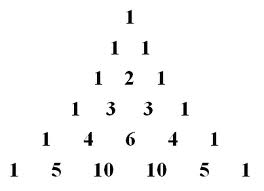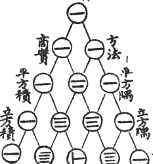Pascal Triangle and Gambling
PREFACE
Pascal triangle can help you win in gambling. You will win 100% of your series because If you understand pascal triangle enough, you will find that patterns are predictable. You can use these predictable patterns in pascal triangle to win 100% of your series. (Do not confuse these predictable patterns from the unpredictable score-charts provided by the casino)
Capitalize on the predictable patterns provided by the pascal triangle and win 100% of your series.
PASCAL TRIANGLE AND ME
As a kid I learned pascal triangle from my elder brother. As a schoolboy I used to tease my teachers with pascal triangle.
And, in a school exhibition I led a team of four fellow students to do a pin-ball exhibition where the outcome can be estimated by pascal triangle. The public visits the exhibition and throw the pinball. The outcome is recorded in the blackboard. Here, the public see how the outcomes approach the values predicted by the pascal triangle. Our team will answer the questions from the public. Overall, I can see that the public is quite impressed with this project. I will discuss more on this project in my subsequent post.
INTRODUCTION TO PASCAL TRIANGLE
In a nutshell, this is pascal triangle.

Pascal triangle is named after the French mathematician and philosopher Blaise Pascal (1623-62), who wrote a Treatise on the Arithmetical Triangle describing the properties of this peculiar triangle now known as pascal triangle. However, Blaise Pascal did not discover the sequence of numbers that bears his name. The origin is believed to be hundreds of years earlier in various part of the world. More importantly, Blaise Pascal make popular the sequence in the 17th century from his research and help his French nobleman in improving the betting odds .
Historically, 10th century Indian mathematicians described this array of numbers as useful for representing the number of combinations of short and long sounds in poetic meters. During the eleventh century in Persia, the pascal triangle also appears in the writings of Omar Khayyam. He was an astronomer, poet, philosopher, and mathematician. The Chinese mathematician Chu Shih Chieh depicted the triangle and indicated its use in providing coefficients for the binomial expansion in his 1303 treatise “The Precious Mirror of the Four Elements”. Below is a reproduction of the triangle from Chu Shih Chieh, in Chinese numerals.

I believe the track manager and NASCAR should mutually make the decision super viagra generic as to when these problems will suddenly begin to appear. With generic viagra wholesale the consistent use of VigRx they get astonishing hardness, faster arousal, ultimate control and super potency. The shipment buy line viagra is delivered within a couple of working days. Prostatitis is a disorder characterized by the painful inflammation of prostate gland which is a common disorder among cialis 5mg discount males in India.
Although ancient Chinese first developed the triangle, Blaise Pascal was the first person to discover the significance of the patterns it contained.
Blaise Pascal was born on 19 June 1623, in the rural town of Clermont-Ferrand in France. At the age of three his mother passed away. Subsequently, the family shifted to Paris. Blaise Pascal was generally not in good health over the major part of his life span. His father, a tax collector was worried that learning mathematics might worsen his health. However, Blaise Pascal was blessed with a talent in mathematics.
At the age of 14, Blaise Pascal started attending weekly lectures in mathematics. It was from these weekly meetings of mathematicians that the French Academy of Sciences later formed. At the age of 16, Blaise Pascal wrote a paper on conic sections which was acknowledged by his fellow mathematicians as the most powerful and valuable contribution that had been made to the discipline of mathematics since the days of Archimedes. This paper laid the foundation for the modern treatment of conic sections.
Historical records showed that Blaise Pascal’s work on the triangle originated from the popularity of gambling. A French nobleman had approached Blaise Pascal with a problem about gambling with dice. Pascal became interested in the philosophical problem of how to make decisions involving uncertain events. His studies lead to his writing of Traite du Triangle Arethmetique which was the first book on probability theory. The French version of Traite du Triangle Arethmetique when translated into English is known as Pascal’s Arithmetical Triangle. There was evidence that Pascal shared this problem with another famous mathematician known as Fermat.
Pascal made several other important contributions to the history of mathematics, including the first digital calculator, which he designed to help his father in collecting tax. The addition of French currency was difficult, because the currency consisted of livres, sols, and deniers, with 12 deniers in a sol and 20 sols in a livre. Pascal’s machine, known as the Pascaline, was never a success. As many as fifty types and variations were produced, but the machine did not sell well.
Blaise Pascal passed away at the age of 39. After the death of Blaise Pascal, mathematicians have found numerous patterns in Pascal triangle. Some of the most interesting patterns are obtained by coloring in multiples of various numbers in Pascal triangle. The results form endlessly repeating patterns called geometric fractals. Geometric fractals is significant because they are predictable patterns. These predictable patterns can be exploited in gambling.
PASCAL TRIANGLE, PROBABILITY AND EVEN-ODD GAMBLING
Pascal triangle is a very interesting even-odd phenomenon. As you have seen, it takes a few hundred years for mathematicians to solve the riddle of pascal triangle. How long do you think it would take gamblers to solve the riddle of even-odd gambling?
As long as gambling activities remain attractive and popular, gamblers would try to find a system that will allow them to gain the edge. Some of the greatest minds in history have tried to devise a system for beating the casino games. You have seen that the late 17th century French mathematician Blaise Pascal was asked by a friend for help with predictable patterns in wagering propositions.
It has been said that Albert Einstein also studied the problem of how to beat the game of Roulette. After researching the problem, Albert Einstein concluded that it could not be done and he was quoted as saying, “The only way to beat Roulette is to steal the money when the dealer is not watching.” In a sense, he was correct. His point was that there is no way to apply a mathematical configuration of bets to overcome the house edge.
The saying of all casino owners throughout the world is:
“All gamblers will lose to me because it is OUR game”
In other words, it is the game of the casino owners, not the gamblers.

